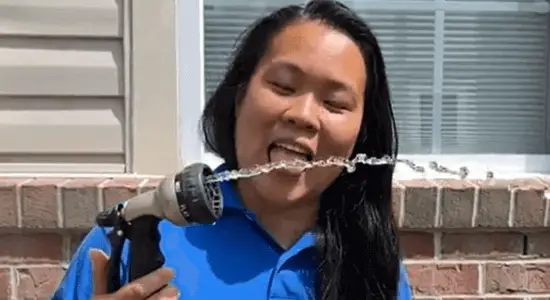Table of Contents
We have various water sources like taps and garden hoses at home. You may have drunk from a garden hose after spending the day outside. While it seemed the same, you might have a question: Is hose water the same as tap water?
Hose water and tap water share the same municipal supply. However, running water through a hose can alter water quality due to contamination. Avoid drinking directly from a hose, as it may contain toxic chemicals like lead and bromine. Use a hose filter if you want to drink the water; otherwise, stick to tap water to protect your health.
Before consuming hose water, understand tap and hose water for health and safety. Let’s explore if hose water is the same as tap water.
Hose Water vs Tap Water
Hose water and tap water differ in several aspects. Hose water, which may have impurities, is usually obtained from an outdoor hose. It may need proper filtration, resulting in lower quality than tap water. Tap water is regulated, treated, and tested to meet safety standards. So it is considered a safer and more reliable option for drinking and other domestic uses.
Quick Comparison Chart- Hose Water vs Tap Water
| Highlighted Features | Hose Water | Tap Water |
| Source | Outdoor faucets | Indoor faucets |
| Safety & Regulation | Privately handled may not meet quality standards | Local government bodies meet quality standards |
| Treatment | No treatment | Extensive treatment process |
| Contaminants | May have contaminants | No contaminants |
| Taste and Odor | Unpleasant taste and odor | Pleasant taste and odor |
| Chlorine Levels | No specific chlorine level | Specific chlorine level |
| Usage | Watering garden or washing vehicles or house cleaning | Drinking, cooking |
Hose Water vs Tap Water- Key Differences
- Source
Hose water comes from outdoor faucets that may connect to a sprinkler or local water supply unit. On the other hand, tap water sources directly from indoor faucets in homes, offices, or other buildings.
- Safety & Regulation
Local government bodies regulate tap water. It meets certain quality standards to ensure it is safe for consumption. While the hose water is generally not regulated. So there is a maximum chance it may not undergo the same level of scrutiny.
- Treatment
Tap water often goes through extensive treatment processes such as filtration and disinfection. Some suppliers ensure additional purification methods to make it secure for health. On the other hand, hose water usually does not undergo such treatment except for basic filtering to remove impurities.
- Contaminants
Tap water is regularly tested for various contaminants and is subject to strict supervision to minimize pollutants. But the hose water may contain impurities like dirt, debris, or chemicals. Hoses are uncleaned, and hose water is not processed through the same rigorous testing as tap water.
- Taste and Odor
Tap water is generally treated to improve taste and remove unpleasant odors. In comparison, the hose water does not undergo such treatments. So it may have a foul taste and odor due to exposure to the outdoor environment and potential contaminants from the hose.
- Chlorine Levels
Tap water often contains a certain chlorine level for disinfection to kill harmful bacteria. While the hose water may have lower or inconsistent chlorine levels, as it may not receive the same chlorination treatment.
- Usage
Tap water is used for human consumption, so it meets quality standards for drinking purposes. It can also be used for cooking or watering indoor plants etc. On the other hand, hose water is generally not recommended for drinking due to potential contaminants and lack of regulation. So, it is used for non-consuming purposes such as watering plants, washing vehicles, or house cleaning.

Can I drink tap water directly?
Mostly, drinking tap water directly is safe. Tap water may contain trace amounts of minerals like copper; these levels are harmless. However, you must take precautions to prevent health risks in certain conditions.
- When water purity is a genuine concern in your area. You may live in an area where there is a risk of high levels of harmful bacteria like E. coli or V. cholera.
- Avoid tap water when your home’s plumbing system has lead pipes. It is best to stop drinking tap water temporarily until the lead pipes are replaced.
- Avoid drinking during instances of recent contamination, such as flooding that introduces pollutants into the water supply.
Is hose water safe to drink?
Drinking hose water is unsafe due to potential bacteria and insect contamination. Hoses are often exposed to unsanitary conditions, making them unfit for drinking purposes. It is advisable to avoid consuming water from garden hoses or outdoor faucets.
Is hose water safe to shower?
Hose water may not be safe for showering. Garden hoses are not designed for potable water and may contain harmful chemicals or bacteria. Using water from a safe and clean source for personal hygiene is best.
Is hose water safe for fish?
Hose water may not be safe for fish. Hoses often contain algicides and mold inhibitors that are dangerous for fish. Drinking water is considered a safe water option to fill your aquarium. However, if you have filters and ensure the hose is clean, you can use hose water for aquariums.
Is hose water safe to swim in?
You may find it suitable to swim. However, for swimming, my answer is no. Hose water is not safe to swim in. It is usually untreated and can contain contaminants such as bacteria, chemicals, and other impurities that can harm your health. Before filling your swimming pool with hose water, ensure your hose is clean. It is preferable to use the filter to remove significant water impurities.
Conclusion
Hose water and tap water are different. While tap water undergoes rigorous testing and treatment to meet safety standards, hose water may contain impurities. To ensure your health and well-being, drinking water from a tap, filter or bottle is better. If it is necessary to use hose water, invest in a filtration plant to clean it.


